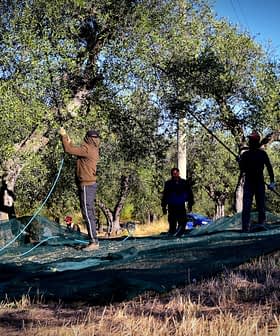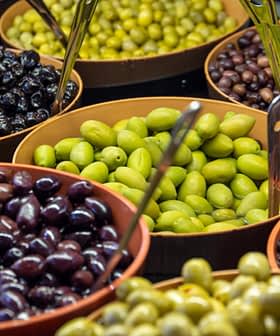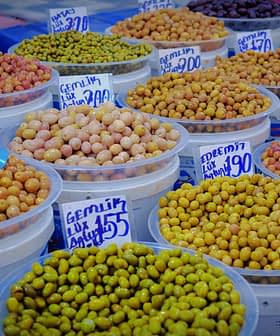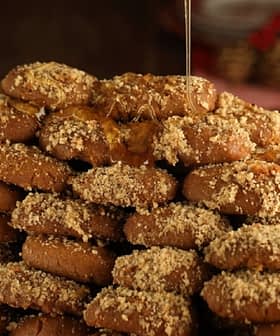Kalamata Dominates Greek Table Olive Market
Krinos Foods Canada Ltd. president Alexander Georgiadis on the position of Greek table olives in a changing global marketplace.
 Krinos Foods Canada Ltd. president Alexander Georgiadis (Vasilis Nanis for ‘Elaias Karpos – El’ magazine, Agronews)
Krinos Foods Canada Ltd. president Alexander Georgiadis (Vasilis Nanis for ‘Elaias Karpos – El’ magazine, Agronews)Alexander Georgiadis, president of Krinos Foods Canada Ltd, discussed the success of Greek table olives, particularly the Kalamata variety, in international markets with Agronews. He highlighted the need for a proper strategy to maintain the dominance of Greek olives in the global marketplace, especially in the face of competition from other countries producing “Kalamata type” olives at lower costs. Georgiadis also emphasized the importance of quality fruit and treatment in producing high-quality table olives, and expressed optimism about the future of Greek olives, especially varieties like Halkidiki and Kalamon.
Alexander Georgiadis, president Krinos Foods Canada Ltd, spoke with Agronews on the current state of the Greek table olive market.
How are table olives doing on the global market and what is the position of the Kalamata olives in the international market?
Greek table olives mainly of the Kalamata variety but increasingly also Halkidiki olives have grown steadily over the last years and have a very strong presence in all markets. Today Kalamata olives are the highest selling table olive variety and have a dominant position in world markets.
We need to develop a proper strategy so that the success of the Greek Kalamata olive can be sustained in a global marketplace.
Do you expect Greek Kalamata olives to maintain their dominant position or might things change in the future?
There are several risks for the future of Kalamata table olives. Products going by the name of “Kalamata type” are produced in other countries such as Egypt and Turkey, and without the right strategy for the product there is a risk that Greek table olives will have the same fate as Greek olive oil. “Kalamata type” olives grown in Egypt or Turkey have a price advantage as they are produced at much lower cost and can undercut Greek Kalamata olives. That is why we need to develop a proper strategy, so that the success of the Greek Kalamata olive can be sustained in a global marketplace.
What makes for quality products when it comes to table olives, is it the variety of the fruit or the treatment that makes a successful product?
You have to start with a sound product from the very beginning. A bad product takes enormous effort to develop into a mediocre product, and will never become good. So, at the start of success is a very good fruit, which once nurtured by the right treatment can be developed into a high-quality table olive. This is always the case, even in our line of work which is commerce. With good quality products you can capture customers attention achieve good sales, secure fair levels of profit and offer good services to the clients. Beginning with the wrong type of product, on the other hand, is a critical weakness that is very hard to overcome.
What share of the international market of table olives do Greek olives account for and what is the share of Greek olives in relation to the total sales of your company?
I am not aware of the numbers regarding the position of Greek table olives in the international market. But I can tell you that our own company – both the Canadian and US companies added together must be the third or fourth largest buyer of Greek olives currently. The quantities of olives we import and distribute are very important especially for the US market and that includes not only Kalamata but also in Halkidiki olives, which have been gaining new market shares due to their quality and size. They are particularly large in size in comparison with the Spanish olives, which are their main competitors.
You spoke before about Halkidiki olives, is it just the quality and size that make them stand out or are there other advantages too?
Quality and size are a crucial advantage to Halkidiki olives but there is another factor which comes into play and which is unfortunately not the case with Kalamata olives. Halkidiki olives benefit from a relative price stability. Unfortunately, the price of Kalamata olives is not stable. Moreover the price of Halkidiki is not only stable but is also very competitive.
Kalamon on the other hand, while being an excellent product, is certainly affected by big fluctuations in prices. This has been a challenge for Kalamata olives. I suspect it has to do with the way the system works in Greece and the role of middlemen who can control prices by stocking quantities of olives and raising prices so that they can sell at a later stage and at a higher profit.
Do you think there could be improvements in the way that markets for olives work?
There are problems in the way that markets operate and prices are distorted due to practices undertaken by middlemen who often choose not to sell, waiting for prices to rise. As a result we end up losing sales opportunities. For example, if demand for pitted olives cannot be covered by Greece, many overseas customers will turn to “Kalamon type” olives from Turkey despite the fact that their quality is inferior. This has happened repeatedly in the past. I often get emails from Egyptian companies, which offer me Egyptian olives at much lower prices. This is the reality and this has been made worse by the fact that there is no steady supply so that the Greek exporters can promote the Greek product effectively.
What are the Greek varieties of table olives with the greater potential?
The variety of Halkidiki and Kalamon, of course. However, I believe that with certain improvements in the way the tree is cultivated at the production stage, the Amfissis variety also has great potential.
What are the major technological developments you anticipate in the olive sector, that can bring significant changes in the years to come?
There are major changes in terms of technology, but besides these technical developments, the most important change is, so to speak, the positive part of the crisis of the Greek economy. What we are seeing is that many young and educated Greeks have returned to rural areas to take up work in the agricultural sector, which can be a very profitable business if it is carried out properly. Now we have farmers, who cultivate larger areas, in a much more professional and effective way who can deliver better results.
Technically, important things have been achieved, such as the decoding of the DNA of the olive tree. We now can achieve a level of traceability that allows us to know a greater level of detail about the origin of each olive fruit, not only down to country level but also trace down the region in which it has been produced, with very high accuracy. Technological developments also allow the farmer to have much higher yields per acre.
About the Krinos Laboratory of the American Farm School of Thesaloniki, your company supported this laboratory from step one and today you are sponsoring the 1st World Conference on Table Olives which took place at the American Farm School. What is the vision of your company regarding the future of Greek table olives?
We are backing the Conference hoping that it can contribute to tackling the problems of the Greek table olive sector. Greece, being one of the most important exporters of edible olives, has to be a pioneer not only in terms of volumes of production but also by setting the major trends in the industry. We would want Greece to be a protagonist of the future developments in the field of edible olives.
Olive Oil Times and the Greek publication Agronews are working together to bring you agricultural news from Greece.









